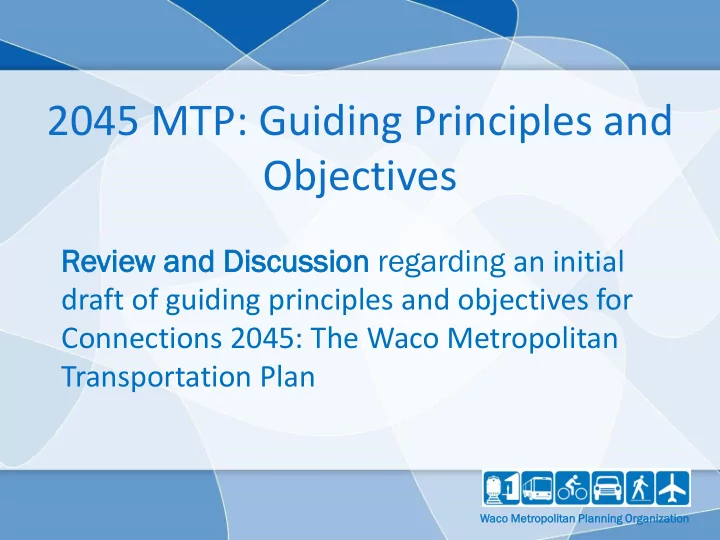

2045 MTP: Guiding Principles and Objectives Revie view w an and Discussion cussion regarding an initial draft of guiding principles and objectives for Connections 2045: The Waco Metropolitan Transportation Plan Waco Metrop opolit olitan an Planning ning Organiz nizat ation ion
What is the Metropolitan Transportation Plan (MTP)? • Identify regional transportation goals • Identify projects to be constructed or implemented by 2045 – Projects that help achieve plan goals – Includes regionally significant projects from each mode • Highways, Public Transportation, Aviation, Rail – Inclusion required for federally funded highway & transit projects • Projects must be constrained against a realistic estimate of future revenues
2045 MTP: Guiding Principles • Why do we have guiding principles? – Ensure value driven decision making – Inform strategy – Set expectations for desired changes – Mix of Aspirational & Core Values • What we should accomplish by 2045? – Develop improvements to multi-modal transportation system – Anticipate future transportation challenges • Beyond resources forecasted to be available
2045 MTP: Guiding Principles Factors influencing revisions • FAST Act Requirements – Performance indicators should guide funding prioritization • Disruptive Technologies – Are We Capturing Trends Now? – Shared mobility and micro-mobility – Automated vehicles – Expected trends during 25-year planning horizon • Trends revealed through other processes (examples) – Local comprehensive plans (land use, development nodes) – Freight studies (local freight delivery) – Public transportation studies (equitable access to jobs & essential services)
Proposed Guiding Principle #1 Satisfactorily maintain existing transportation facilities • Refine existing objectives: – Facility improvements – Performance assessment measures – Preventative maintenance measures • Create new objectives: – Consider performance assessment measures for transit – Consider impacts of disruptive technologies (automated vehicles) – Consider multi-modal transportation needs (bicycle and pedestrian)
Proposed Guiding Principle #2 Improve the safety and security of the transportation system • Refine existing objectives: – Performance assessment measures – Pedestrian access measures • Create new objectives: – Consider specific safety needs of bicyclists and pedestrians – Consider impacts of significant storm events
Proposed Guiding Principle #3 Maximize the use of existing transportation facilities before system expansion • Refine existing objectives: – Performance assessment measures – Incident management strategies – Consider right-sizing solutions – Change focus from LOS to most congested corridors – Leveraging of existing funding? • Create new objectives: – Consider impacts of disruptive technologies (automated vehicles) – Consider needs of bicyclists and pedestrians in roadway retrofit projects
Proposed Guiding Principle #4 Preserve regional air quality and environmental standards • Create new objectives: – Consider impacts of disruptive technologies (shared mobility/micro-mobility) – Consider impacts of preferred land use trends – Consider potential project impacts to culturally and environmentally sensitive sites
Proposed Guiding Principle #5 Support regional freight movement and economic development efforts • Refine existing objectives: – Performance assessment measures – Role of freight as part of economic development • Create new objectives: – Consider local and regional freight accommodations – Consider impacts of disruptive technologies (connected and automated vehicles) and parcel delivery industry
NEW Proposed Guiding Principle #6 Improve access to economic opportunities and essential services • Create new objectives: – Define performance assessment measures – Consider equitable access to opportunity – Consider different needs for urban v. rural populations
Recommend
More recommend